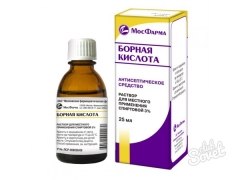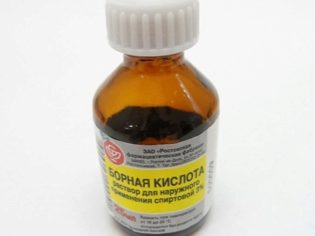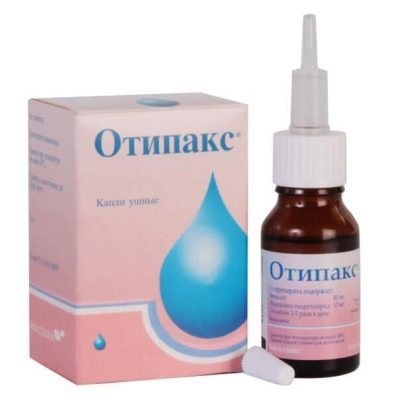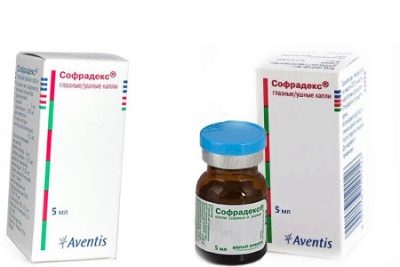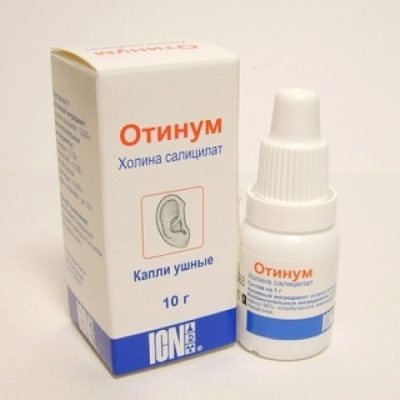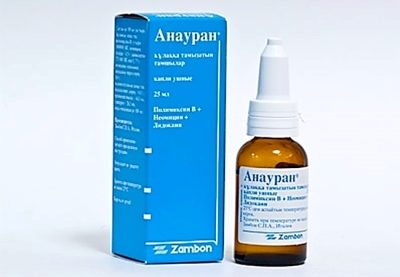Boric acid for children: instructions for use
For decades, boric acid has been known as a rather effective antiseptic. Such a drug is used in their practice by ophthalmologists, ENT doctors and dermatologists. This inexpensive tool is available in all pharmacies and is often prescribed for otitis in adults. But is it possible to treat children with boric acid? Opinions of physicians and parents on this subject are very different.
Release form and composition
Boric acid can be purchased in two forms:
- Powder. It is packaged in bags and cans of 10 or 25 grams. Such a fine powder has no smell or taste. In addition to boric acid, there are no other ingredients in this form.
- Alcohol solution. The concentration of boric acid in this form is 3%, and the remaining volume is represented by ethyl alcohol. The solution is sold in bottles with a capacity from 10 to 100 ml. It is a colorless transparent liquid that has an alcoholic odor.
Action on the body
Boric acid is known for its disinfecting effect. Such a compound has an antifungal and antiparasitic effect, and also has an anti-pediculosis and anti-bacterial effect. Boric acid is used only for external processing, but the drug is well absorbed and has a therapeutic effect for a long time.
Indications
The scope of application of boric acid in our days has narrowed considerably, which is associated with a sufficiently large frequency of occurrence of side effects. This drug is in demand mainly for diseases of the ear, as well as for treating the skin with dermatitis. Adults can take boric acid into the ear canal or compress it with this medicine. Also, this drug is used for pediculosis, pyoderma and weeping eczema.
With conjunctivitis Often used eye drops, which include boric acid. For example, the combination of "boric acid + zinc sulfate" is found in many medicines prescribed by ophthalmologists.
Contraindications
Boric acid is not prescribed:
- With intolerance to such a drug.
- With kidney disease.
- When perforation of the eardrum (the drug can not be dripped into the ear).
- For the treatment of hair-covered skin.
- For the treatment of damaged skin.
Is it possible to use in children
According to the instructions for boric acid, the use of such drugs for children is prohibited. The drug is not recommended to use up to 15 years of age. This remedy is especially dangerous to infants, so it is categorically contraindicated for babies younger than a year. However, many ENT doctors run the risk of prescribing boric acid to children under 15 years of age. They prescribe a drug at 2 years, 4 years, or at another age, relying on their own medical experience.
If the doctor sees the indications for the use of boric acid and takes responsibility, then it is permissible to treat children with this tool. But to apply such an antiseptic in childhood on the advice of relatives or friends is not recommended. In addition, the otorhinolaryngologist will not prescribe boric acid as the only treatment for otitis. This medication will be surely supplemented with other drugs, such as antibiotics.
How to drip in the ear
If the doctor confirmed the child has otitis and prescribed boric acid, it should be used at home correctly. Act according to the following guidelines:
- The drug is heated before use.For this it is best to lower the bottle with the solution in warm water. It should be heated for a short time, up to body temperature.
- If a powder is used, it must be diluted with warm water to obtain the desired concentration.
- The child must be laid on its side so that the sore ear is located at the top.
- The ear canal is cleaned of contamination using a cotton swab with hydrogen peroxide.
- After dropping the amount of drops prescribed by the doctor into the sore ear, you need to wait about 10 minutes, and then the ear canal is soaked with clean cotton to remove any residual medication.
- If the otitis is bilateral, the same procedure must be done for the second ear.
- You should drip your ear twice a day for a week, unless your doctor has prescribed another regimen.
Usually, the result (reduction of pain and discomfort) is noticed after only one or two procedures, but it is undesirable to stop the instillation before the prescribed ENT doctor period so that the illness does not reappear after some time.
More clearly how to drip the ear of a child can be seen in the next video.
Side effects
Boric acid treatment can cause:
- Severe nausea.
- Problems with the work of the kidneys.
- Migraine.
- Confused consciousness.
- Vomiting.
- Cramps.
In some cases, the use of boric acid leads to a state of shock.
Overdose
When using boric acid in too large a dose or in a situation where a child accidentally drank the drug, poisoning occurs. It is manifested by vomiting, loose stools, CNS depression, fever, rash, and other symptoms. For a child’s body, 4–5 grams of this acid is a lethal dose.
Prolonged slight overdosing of boric acid leads to chronic intoxication. The patient has exhaustion, hair loss, anemia. Edema and eczema may appear at the place of use. Also signs of such an overdose are stomatitis and convulsions.
Reviews
The attitude of doctors to boric acid has changed dramatically in recent years. Some experts still prescribe this medicine and note that it helps well in otitis. However, most doctors refused to use boric acid in pediatric practice in favor of more modern means with less risk of complications.
Moms who dripped the inflamed ear of the child with boric acid after prescribing an ENT doctor, generally note the rapid effect of such a drug. After instillation, the child has a feeling of heating and even a slight burning sensation, but this is normal. According to parents, such a drug helps to get rid of shooting pains and improves the condition of otitis, but it is important to follow the dosage prescribed by the doctor.
Storage features
Keep boric acid should be in a place where this drug will not be available for the child. The temperature during storage of boric acid should be at room temperature. Expiration date of solution of boric acid - 3 years.
Analogs
For pain in the ear and inflammation, doctors often replace boric acid with such ear drops:
- Otipaks. This drug is an analgesic antiseptic. It is allowed to drip into the ear of children, even in infancy.
- Sofradex. As part of this drug, antibiotics are connected with a glucocorticoid. The drug is prescribed at the age of more than 1 month and can be used both for diseases of the ear and for ophthalmic pathologies (it can be dripped into the eyes).
- Otinum. The basis of this drug is choline salicylate. The drug is permissible to bury in the ear to children older than a year.
- Polydex. This anti-inflammatory agent includes antibiotics and the hormone glucocorticoid. It is prescribed for external otitis at any age.
- Anauran. It is a combination medicine consisting of antibacterial compounds and anesthetic. It is permissible to use it for otitis in children older than one year.
If you want to replace boric acid with another antiseptic, for example, for washing the skin, use:
- Betadine. The basis of this medicine is active iodine.It is used for diaper rash, stomatitis, pressure sores, skin infections and many other problems. Rinsing the skin with Betadine is allowed for children older than one month.
- Miramistin. Such an antiseptic is in demand in the treatment of wounds, burns, otitis, sinusitis and other diseases. It is often used for thrush in the mouth and chronic tonsillitis. Children Miramistin solution prescribed from 3 years of age.
It is of course up to you to use boric acid with otitis in a baby or not, and we suggest you to see the advice of the children's specialist Dr. Komarovsky.
